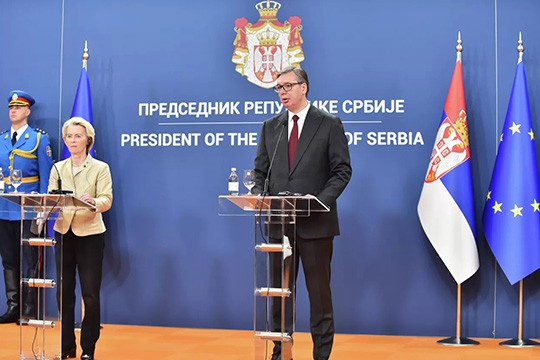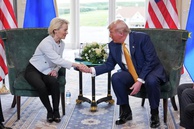The October 15-16 official visit to Serbia by European Commission President Ursula von der Leyen ramped up Western pressure on Belgrade. During her visit, she demanded that Serbian President Aleksandar Vucic join the EU's sanctions against Russia. During a press conference following the visit, Ursula von der Leyen said that "Brussels will not be able to consider Belgrade a reliable partner, which effectively rules out the possibility of the country's admission to the European community."
Aleksandar Vucic thanked the head of the European Commission for acknowledging the country's aspiration to join the European community and reiterated that Serbia's accession to the European Union remains a strategic goal and a priority of Belgrade's foreign policy.
However, the head of the European Commission went further, warning that "Now is the moment for Serbia to get concrete about joining our Union. We need to see greater alignment in our foreign policy, including on sanctions against Russia.” She assessed Serbia’s level of alignment with the European Union's foreign policy at 61 percent. "But more is needed," she added.
How could she possibly be able to calculate this alignment so accurately? Not 60 percent, but 61?!
Apparently, according to the European officials' plan, the institutional process of EU enlargement stipulates that, as a precondition for entry, all candidate countries for accession must 100 percent reorient their foreign policy towards Brussels. This means that they are obliged to adhere to all, without exception, foreign policy decisions of the European Union, despite the fact that these countries had and have no influence on their adoption. This is one of the basic preconditions for EU membership, but its fulfillment alone does not guarantee admission. 1
Currently, five Western Balkan countries, including Serbia, Albania, Bosnia and Herzegovina, North Macedonia, and Montenegro, have official candidate status for EU membership. Self-proclaimed Kosovo has also applied for accession, but, according to Brussels, obtaining candidate status has to be earned not just by using anti-Russian rhetoric, but by concrete steps, primarily by joining EU sanctions against Russia, as Ursula von der Leyen openly declared in Belgrade.
Applying for EU membership is just the beginning of a journey, often a long one, and includes elements of "re-education." For example, North Macedonia became a candidate in 2005, Montenegro in 2010, and Serbia in 2012. The example of Turkey is very telling here, with Ankara having been waiting for membership for over a quarter-century now, applying back in 1999. The last country able to navigate the "Scylla and Charybdis" of EU demands was Croatia, which was admitted to the Union in 2013, following more than a decade-long accession process.
From the standpoint of grand European politics, Serbia is viewed as a priority among the Balkan countries. First, because it occupies a significant part of the Western Balkans territory (88,400 sq. km) and has a larger population (6.7 million people) among EU candidate countries. Secondly, a key factor in Brussels' intensified efforts in the Western Balkan countries is without any doubt Belgrade's traditional friendly ties with Moscow, which have stood the test of time. Serbia remains a "white spot" on the Western European map, a country, which refuses to take orders from Brussels.
As Russia’s Foreign Minister Sergey Lavrov noted during a news conference on the results of Russian diplomacy in 2024, Russia and Serbia share a long history of joint struggle against Nazism, a joint struggle for the respect of peoples' right to self-determination. "We support each other politically and in international organizations. Of course, we see that Serbia is simply having its arms twisted right now," Lavrov said, adding that Serbia is being pressured to recognize Kosovo's independence and impose sanctions against Russia as a condition for joining the EU, which is tantamount to coercing the country into self-humiliation and an invitation to betray its ally. 2
Meanwhile, this pressure keeps mounting. Von der Leyen's October visit to Belgrade coincided with Washington imposing sanctions against "Naftna Industrija Srbije" (NIS) - the biggest energy company in the Western Balkans, where Russia's "Gazprom" is the majority shareholder. The United States demands that NIS change its shareholding structure to squeeze out Gazprom by nationalizing or buying out the Russian stake. President Vucic reportedly offered Russia to sell its share in NIS for $800 million, despite the fact that since acquiring a controlling stake in 2008, Gazprom has invested over $3 billion in the company's development, making it high-tech and highly profitable.
As a result of US sanctions, NIS was cut off from SWIFT, with its largest refinery in Pancevo rendered unable to receive raw materials via the JANAF oil pipeline, which belongs to Croatia. Currently, the Serbian refinery operates on existing oil reserves and if it stops operating Serbia could face a fuel and energy crisis, especially now that Moscow has informed Belgrade that the agreement on Russian gas supplies at current, quite favorable prices will last only until the end of this year. Vucic said he was "disappointed" by the news, adding that he had discussed a new agreement when meeting with President Putin in Beijing in early September.
By supporting US sanctions against NIS, the EU Council approved a phased cessation of Russian gas imports, including a ban on its transit via EU territory to third countries starting from January 2026, which effectively deprives Serbia of its primary supply route.
The looming EU ban on Russian gas transit to Serbia has effectively pushed Belgrade into a dead end as the country lacks alternative supply sources that could cover its current needs. According to Aleksandar Vucic, "even if we get reverse flow from Hungary, we would still have to build a new interconnector or a so-called connecting gas pipeline from North Macedonia. This will not solve the problem, though, because I am not sure that we could afford paying 30–40 percent more, than we paid for Russian gas. Therefore, I see no alternative to Russian gas." 3 Russian gas accounts for over 80 percent of Serbia’s consumption, and losing it would cost Belgrade $10 billion.
Faced with the impending EU ban on Russian gas transit, Belgrade finds itself in an almost hopeless situation.
"Serbia is in an extremely difficult and almost hopeless position, as the Council of the European Union has approved a ban on the transit of Russian gas through EU territory to third countries. The situation is almost hopeless, especially considering the ongoing issues surrounding NIS," said Serbia's Minister of Mining and Energy, Dubravka Dedovic Handanovic.
However, despite the complexity of the situation, she still emphasized that Belgrade is counting on President Aleksandar Vucic and his "excellent relations with world leaders." She added that Serbian authorities were making every effort possible to solve the problem to minimize losses, despite foreign policy and economic challenges.
The question is, however, what exactly the Serbian leadership can do to solve this problem.
On the one hand, Aleksandar Vucic says that the conflict in Ukraine "crushed the European economy," while on the other, he asserts that Serbia has no other way to go than to become part of the European Union. Furthermore, at the June 11 "Ukraine - Southeast Europe" summit in Odesa, Vucic supported Kyiv's aspirations to restore Ukraine within its 1991 borders, noting that Belgrade continues to support Ukraine's territorial integrity and is ready to provide humanitarian and political assistance to Kyiv. That being said, he still refused to sign the summit's final declaration on strengthening anti-Russian sanctions.
Many experts explain the duality of the Serbian president’s position by his attempts to sit on two chairs. However, as he himself has repeatedly stated, "I only have one chair and not two chairs, which means that we make our own decisions and that we have supported Ukraine when it comes to humanitarian and financial aid."
Still, a certain stability in relations between Russia and Serbia persists due to the historical affinity between our two peoples and their mutual interest in developing political, economic, cultural, and military cooperation. This is precisely what Brussels is trying so hard to destroy.
A Western-controlled hybrid information-psychological network has long been deployed and active in Serbia, designed to exercise control over the public consciousness. One of its main goals is to destroy the traditional ties between the Russian and Serbian peoples, to make them forget the memories of their joint struggles and victories. This goal is openly proclaimed not only in the West, but by some high-ranking Serbian officials too. A new project launched by the CIA and intelligence agencies of several European countries aims to "develop Serbian citizens' skills in navigating a complex and diverse media space" by providing them with "reliable and objective" information.
According to the Russian news agency TASS, citing the press bureau of Russia's Foreign Intelligence Service (SVR), the US and the European Union plan to bring to power in Serbia a loyal pro-Western leadership, and are actively preparing a "Serbian Maidan."
The Serbian leadership finds itself in a real fix, as it wants to continue getting cheap energy resources from Russia without falling out with the West. However, this dualism in President Vucic’s stance could backfire and destroy his political career.
Western pressure and Serbia's geopolitical position dictate the rules of the game. I believe that in the near future Belgrade will bend under Western political, economic, and information-psychological pressure, distancing itself from Moscow and gradually yielding ground to the Serbian opposition. Fully aware of this trajectory, Russia will try to avoid unnecessarily complicating the situation for Belgrade, while simultaneously drawing its "red lines" in the relationship.
-------------------------------------------------------------------
1 Von der Leyen: Serbia cannot join the EU without imposing sanctions against Russia. 15.10.2025 https://tass.ru/mezhdunarodnaya-panorama/2534943
2 Russian ambassador: US restrictions against NIS are in response to Serbia’s rejection of anti-Russian sanctions. 16.10.2025 https://interaffairs.ru/news/show/53284
3 Vucic said that he saw no alternative to Russian gas. 21.10.2025 https://www.rbc.ru/politics/21/10/2025/68f6a0d39a7947298b208859
read more in our Telegram-channel https://t.me/The_International_Affairs

 14:07 24.10.2025 •
14:07 24.10.2025 •



























